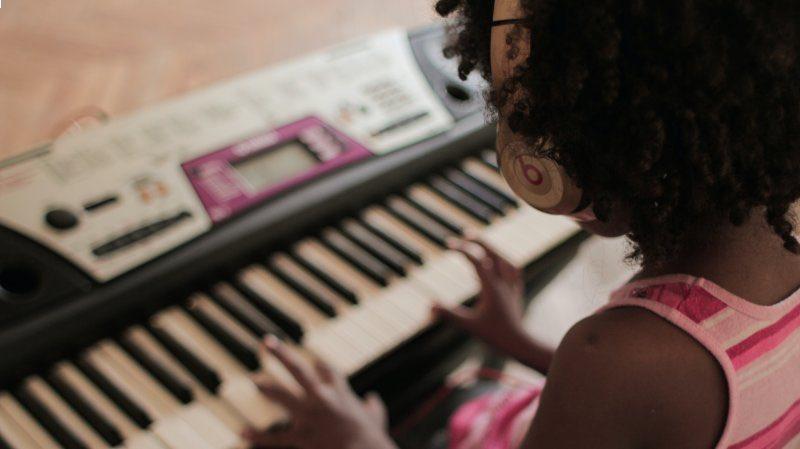There is a lot of debate surrounding electric keyboard pianos. Some people swear by them, while others think they are simply not worth the money. In this blog post, we will explore the pros and cons of playing an electric keyboard piano so you can make an informed decision if one is right for you.
What is the Difference Between an Electric Keyboard and a Digital Piano?
Here are a few things to keep in mind when you are considering an electric piano vs keyboard:
- Electric keyboards are much lighter and portable than digital pianos, making them a popular choice for gigging musicians.
- They also typically have a wider range of sounds and features than digital pianos, giving piano electric keyboard players more flexibility in their playing.
- However, electric keyboards generally have less realistic piano sounds and feel less responsive than digital pianos. As a result, digital pianos are often the preferred choice for piano students and classical musicians.
- While they may not offer the same degree of portability or sound flexibility as electric keyboards, digital pianos provide a more authentic piano experience.
Are you ready to figure out which one is right for you? Sign up for piano lessons and your instructor will be able to walk you through the basics. Plus, you’ll learn other fun tips and techniques like what you see in the video below:
https://www.youtube.com/watch?v=2wQ1ZXph1HI
Can You Learn to Play Piano on an Electric Keyboard?
Are electric keyboards the same as pianos? No. But can you learn to play piano on an electric keyboard? Absolutely.
After all, keyboards are more affordable and portable than traditional acoustic pianos, and they often come equipped with features that can help you to learn more quickly.
However, there are a few things to keep in mind before purchasing an electric keyboard for the purpose of learning to play piano.
For one thing, it’s important to choose a keyboard with a full range of 88 keys, as this will give you the most options for playing music. In addition, it’s helpful to find a keyboard with weighted keys, as this will give you a closer approximation of the feel of an acoustic piano.
Finally, make sure to invest in a good quality keyboard stand and sustain pedal, as these will help you to create a realistic piano playing experience. With these factors in mind, you can be sure that you’ll be able to learn to play piano on an electric keyboard.
Is Electric Piano Good for Beginners?
The electric piano is a great instrument for beginners. It is very versatile and can be used for a wide range of genres, from rock to jazz to classical. Electric pianos are also relatively affordable, and they are easy to transport and store. Additionally, electric pianos require very little maintenance.
However, there are some downsides to playing an electric piano. Electric pianos can be quite loud, so they may not be ideal for players who live in apartments or other close quarters.
Additionally, electric pianos can be tricky to tune, and they may not have the same rich sound as an acoustic piano.
Overall, the electric piano is a great choice for beginner musicians.
Pros and Cons of Playing an Electric Keyboard Piano
There are a lot of considerations for people learning piano, that are thinking about getting a piano or keyboard for their home. Cost is often the largest one, and if you’re not too familiar with the different kinds of piano and keyboard options out there, I wrote another article called “Different Types of Pianos & How To Choose the Right One,” which I encourage you to go and check out. For those of you that are still on the fence about whether to go acoustic or electric, this article will review some important pros and cons to the electric keyboard, and my overall take on the issue. Hopefully, it will help you with your decision!
Pro: Price and Portability
Price is the most obvious pro when it comes to electric keyboards when compared to acoustic pianos. A quality electric keyboard is only going to cost a fraction of a decent upright acoustic piano. A new electric keyboard can run in the mid to low hundreds, where a used acoustic will likely be upwards of one thousand, at least. Acoustic pianos also need maintenance on (at least) a bi-annual basis or the tuning will suffer. Maintenance costs start at around $150, depending on the condition of the piano. And that will not something that an electric keyboard owner would have to worry about. Just don’t drop it!
Portability is another pro for the electric keyboard. Acoustic pianos are extremely heavy, and require movers for transportation (or at least a couple of very strong friends). But without all those heavy strings and mechanisms, the electric keyboard can be easily moved around the home. And it can be transported without the assistance of movers. Electric pianos can be set up on an easily collapsible stand and stored vertically if needed. So size and space requirements are considerably easier to manage.
Pro: Versatility
An electric keyboard will typically have a variety of settings for different stylistic options, and tools built into it for learning and practice aids, such as a metronome. Many electric keyboards have a traditional piano sound setting and an “electric” piano sound which is much brighter. Many also have “synthesizer,” sound settings as well. Or even a library of various band instrument, percussion, and electronic sounds on which one can play. So there is a lot of room for exploration.
Built-in learning tools can also be very useful. Most electric pianos have, at the very least, a metronome tool. This is essential for developing rhythmic ability. Certain brands, like the Casio LK-280 for example, feature lighted-keys to help students learn songs, pre-recorded back-up music to play along with, and even Apple device compatibility.
Pro: Practicality
An electric keyboard piano has a variety of specifications that make it ideal for certain practical situations as well. If you live with other people, or the keyboard is for a child, the ability to control the volume is invaluable. The ability to dial up or down the volume on an electric keyboard makes the time spent practicing much easier on the people and parents around the player. Most models will have a audio jack or a USB port for headphones as well. This means one can practice without any worry of bothering others in the home. Alternatively, they can be hooked up to amplifiers. This means they can be used in loud concerts where the built-in microphones would not suffice.
A USB port can also be used for connecting to music writing programs or recording programs. Certain music writing programs, such as Sibelius or Finale, have the option to use an electric keyboard to input musical notation more easily. This can be a big help when it comes to composing one’s own music. It speeds up the input process and keeps the writing process tied to how it feels to play the music.
Con: Dependent on Power
The most obvious con is that the electric keyboard relies on electricity or batteries to operate. That is, of course, not an issue for an acoustic alternative. But unless you are struggling to find things to do in the event of a loss of power, it shouldn’t be too much of an issue.
Con: Sound Quality
Especially if a very high-quality keyboard is a bit outside of the budget, the richness of sound that an acoustic piano can make just can’t quite be replicated by most electronic alternatives. I don’t want to get to heavy into the sound science of it all. However, this is the reason: When an acoustic piano plays a key, the base level sound, called the “fundamental” sound, isn’t the only one that can be heard. Other sounds called “overtones,” or “partials” mix together with the “fundamental” to make the uniquely complex sound that acoustic instruments create. All acoustic instruments work like this, including the voice. Electric keyboards generally lack the programming to replicate that sound sufficiently. In short, it just doesn’t feel the same!
There is a certain extra something that you can only really get from an acoustic instrument. But that being said, there are a lot of good reasons to go with an electric keyboard piano, to be sure. If you are a new student, if you are on a budget, or if you are wanting to use it for music writing or recording programs, there are considerable benefits with going electric.
Tips for Playing an Electric Keyboard Piano
If you’re interested in playing an electric keyboard piano, there are a few things you need to know before you get started.
First, it’s important to choose the right instrument. There are a variety of electric keyboard pianos on the market, and each one has its own unique features. Be sure to do your research and select an instrument that will suit your individual needs.
Once you’ve chosen your instrument, it’s time to start practicing. Just like with any other type of piano, it takes time and patience to master the electric keyboard piano.
Be prepared to put in the hours of practice if you want to become a skilled player. In addition, be sure to listen to a variety of music so that you can develop your own unique style.
With these tips in mind, you’ll be well on your way to becoming a talented electric keyboard pianist in no time!
What is the Best Electric Keyboard Piano?
There are a lot of factors that go into choosing the best electric keyboard piano. It depends on what you’re looking for and what you’re willing to spend.
If you’re a beginner, you might want to look for something with fewer features.
If you’re a professional, you might want something with more features. If you’re looking for something to play at home, you might want something smaller. If you’re looking for something to play in a band, you might want something larger.
Whatever your needs, there is an electric keyboard piano out there that’s perfect for you.
Electric Piano Keyboards: Final Thoughts
So, should you buy an electric keyboard piano? It depends on your goals and how much money you want to spend. If you’re looking for a quality instrument that will last for years and allow you to play any type of music, we recommend going with an acoustic upright or grand piano.
However, if you’re just starting out and don’t have the budget for a traditional piano, or if you want something more portable that you can take with you on the road, an electric keyboard is a great option.
Just keep in mind the pros and cons we outlined above, and make sure to consider all of your options before making a purchase.
Do you have any questions about buying an electric keyboard? Leave us a comment below and we would be happy to help – or ask your piano teacher for recommendations!
Lance Russell


